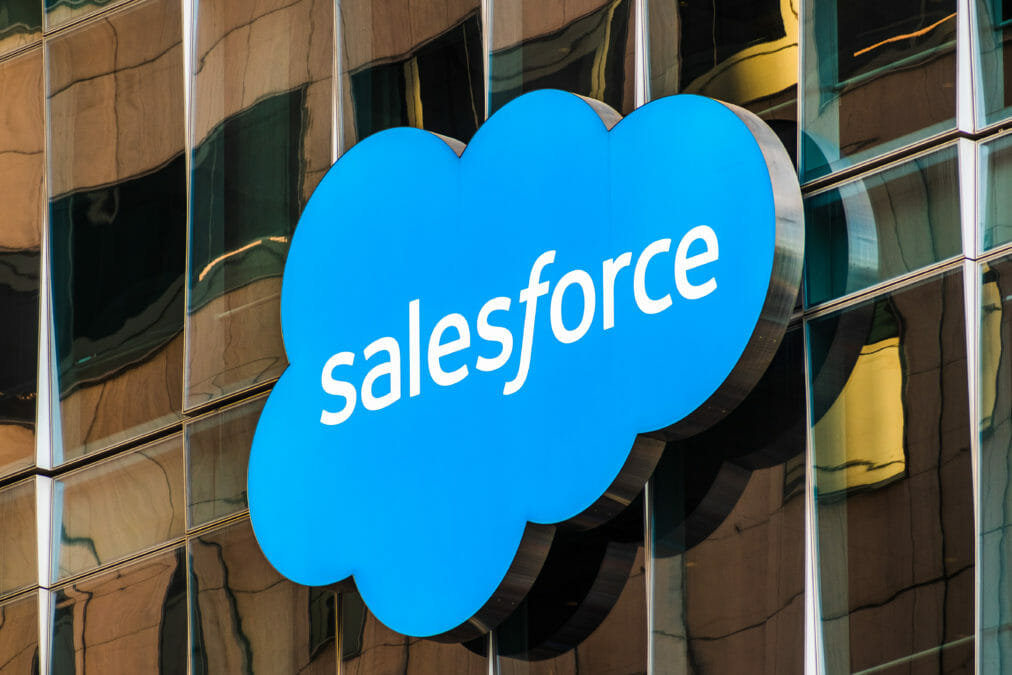Before being acquired by Salesforce, a move that has been heavily rumoured for a number of days, Slack saw its market value double during Covid-19.
The deal, which is Salesforce’s biggest to date financially, will enable the operation of a unified platform for remote communication with employees across the enterprise.
The combination of messaging capabilities from Slack and customer relationship management tools from Salesforce looks to compete with Microsoft Teams, which has been bundled with office software packages.
Despite the substantial surge in market value following a dip, and the launch of Slack Connect earlier in the year, Slack has been left behind by Microsoft and Facebook, both of which have established their own business chat and productivity platforms.
Salesforce, on the other hand, has only seen its market value rise in recent months, without any let up, and is now worth nearly $220 billion.
As part of the agreement, Slack shareholders will receive £20.04 in cash and 0.0776 shares of Salesforce common stock for each Slack share.
“Stewart and his team have built one of the most beloved platforms in enterprise software history, with an incredible ecosystem around it,” said Marc Benioff, CEO of Salesforce.
“This is a match made in heaven. Together, Salesforce and Slack will shape the future of enterprise software and transform the way everyone works in the all-digital, work-from-anywhere world.
“I’m thrilled to welcome Slack to the Salesforce Ohana once the transaction closes.”
We’re thrilled to be acquiring Slack!
Combining @SlackHQ with #Customer360 will be transformative, creating the operating system for the new way to work. Together, we’ll enable companies to succeed in the all-digital, work-from-anywhere world.Important: https://t.co/bRXZ1Iu1fj pic.twitter.com/xcPH5hRb6J
— Salesforce (@salesforce) December 1, 2020
Stewart Butterfield, CEO of Slack, commented: “Salesforce started the cloud revolution, and two decades later, we are still tapping into all the possibilities it offers to transform the way we work. The opportunity we see together is massive.
“As software plays a more and more critical role in the performance of every organisation, we share a vision of reduced complexity, increased power and flexibility, and ultimately a greater degree of alignment and organisational agility.
“Personally, I believe this is the most strategic combination in the history of software, and I can’t wait to get going.”
Big news: @salesforce is acquiring Slack! 🎉 This is going to be transformative for our customers. Together, we’ll deliver the operating system for the new way to work: https://t.co/4wYTX2BQoz
Key info: https://t.co/YfDv07fDKW
— Slack (@SlackHQ) December 1, 2020
Following the deal’s conclusion, Jason Wong, vice-president, research and advisory at Gartner, said: “This is Salesforce’s largest acquisition ever, which we’re saying for the third year in a row with MuleSoft and Tableau in 2018 and 2019 respectively.
“We stated in our 2020 Vendor Rating for Salesforce that it is more than just a CRM company now, and with Slack this positions Salesforce more strongly and broadly in the digital workplace space and employee experience (EX) world.
“Given the size of this acquisition, the strategy (just as with MuleSoft and Tableau) should be all about growth in this new addressable market for Salesforce’s stated revenue ambitions.”
A long time coming
According to Angela Ashenden, principal analyst, workplace transformation at CCS Insight, the acquisition of Slack by Salesforce has been more of a question of when, than if.
She said: “Salesforce has long been eyeing the employee collaboration opportunity – as far back as 2010 when it launched Chatter, later followed by Community Cloud, but neither really provided that extended reach outside sales. Its acquisition of Quip in 2016 was another step in this direction, but Quip hasn’t really expanded its reach within customers either.
“Acquiring Slack would be a major boost here, and Slack’s integration and app story would also play well with Salesforce’s strategy. The potential of Slack Connect and creating a B2B collaboration network would also jive well with Salesforce’s business enablement story.
“From Slack’s perspective, an acquisition has long been a possibility, it’s more just a question of finding the right match.”
Why collaboration is the key to true business intelligence
A need for growth
The need to lead a cloud collaboration market that’s more vital than ever to businesses as they look to continue working remotely, and according to Stephen Kelly, chair of Tech Nation, this deal looks set to increase chances of achieving this for both Salesforce and Slack.
“Salesforce’s acquisition of Slack reflects that, for software companies, the adage “grow fast or die slowly” applies more than ever,” said Kelly.
“As organic growth of its CRM market leadership slows, acquisition has been a core engine for revenue growth and innovation. Salesforce has done multiple innovation acquisitions, as well as buying companies with customer bases in adjacent markets.
“The acquisition of Slack reflects all of these basic drives and is an increasingly strong offer as the coronavirus pandemic forces workers to adopt new forms of communication and collaboration software, putting this at the heart of daily life for office workers.”










